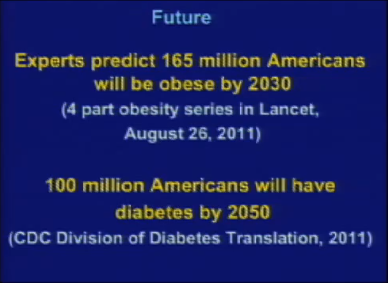Nutrition, Health, and Diet Related Disease
America’s obesity epidemic was the topic of discussion at the September 27 Edible Education: The Rise and Future of the Food Movement session at UC Berkeley. Dr. Robert Lustig, a neuroendocrinologist who studies childhood obesity at the University of California at San Francisco, spoke along with Patricia Crawford, a UC Berkeley professor who has traced the rise of the obesity epidemic and studies healthy food in schools.
Obesity Growth in U.S.
The most startling information came from Patricia Crawford who showed the rise in obesity in the U.S. over the past twenty years through a series of maps. In 1991 there was less than ten percent obesity in most state populations. But we gradually watched the map of the entire country get washed over in bright red, the color indicating the highest rates of obesity. Crawford says, "We need to create healthier food and activity environments to reduce obesity." She’s been working in the school system to figure out how to achieve these goals. Crawford has found that even Berkeley kids, who live in a healthy food mecca, share similar eating patterns to kids in the rest of the state. Crawford listed four activities that can help to control the obesity epidemic:
- Reduce sweet beverage intake
- Reduce fast food intake
- Control portion size
- Reduce time on the computer or tv
Crawford is working in policy development to reduce obesity by trying to get high calorie snacks out of schools and advocating for zoning policies on fast food restaurants near schools. Following Crawford's obesity maps were the equally startling comments on the toxicity of sugar by Dr. Robert Lustig.
